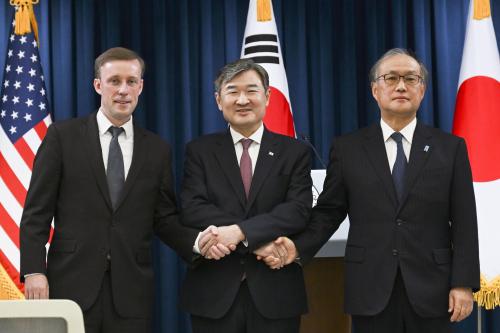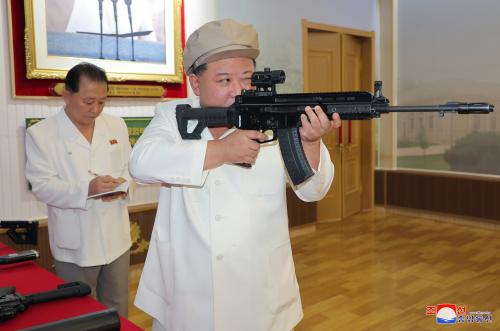“You cannot demonize people when you’re sitting there listening to their music. You don’t go to war with people unless you demonize them first”. Former Defense Secretary William Perry’s comments after attending the ground breaking concert by the New York Philharmonic in Pyongyang on February 26th capture the potential impact of the first major foray into cultural diplomacy with the North Koreans.
Both the critics and the proponents of the concert exaggerate its power to influence events, or, at least, its measurable impact. Did the concert promote or condone the repressive policies of Kim Jong Il? No. Does the presence of an American orchestra in the North Korean capital “whitewash” a brutal dictatorship? No. Will the concert transform the relationship between the United States and North Korea? No. Will it improve ongoing negotiations? William Perry went on to suggest optimistically that “This might have just pushed us over the top” (in moving towards future agreements). If so, the role of the concert and visit will not be measurable.
What the visit and concert did accomplish was to give the North Korean people a real taste of Americans and American culture. The concert and the master classes conducted by members of the orchestra facilitate the type of people to people contact that humanizes the other and changes negative stereotypes. Before the visit of the New York Philharmonic, the North Korean government had largely shaped conceptions of America and Americans for its closed society. In preparation for the orchestra’s arrival, anti-American posters disappeared from the streets. Even before the orchestra had played a note, it changed prior stereotypes: the North Koreans were surprised to see so many nationalities (including Korean Americans) represented in the Philharmonic.
The New York Philharmonic’s trip to North Korea follows in the distinguished tradition of groundbreaking cultural exchanges that includes performances of the opera Porgy and Bess and of the Boston Symphony Orchestra in the Soviet Union in the mid- 1950s and, on the heels of the visit of the American ping pong players, the Philadelphia Orchestra’s 1973 concert in China. Following the Boston Symphony’s visit in 1956, Russian musicians explained that the concerts debunked the myth propagated by the Soviet government that the West was “decadent, uncultivated, and doomed. “ Gradually, the increasingly evident discrepancy between propaganda and reality led the citizens of the Soviet Union and the Soviet bloc to question the official media more and more. “Music is the enemy of totalitarianism”, observed Vaclav Havel in 2000 at a White House Millennium event honoring jazz.
The New York Philharmonic, again following in the tradition of earlier American performers, insisted that the concert not be restricted to elites. Before agreeing to go to Pyongyang, the orchestra sought assurance that the concert would be broadcast. In their jazz tours during the 1950s and 1960s, Dizzy Gillespie and Louis Armstrong insisted on playing additional concerts for the general public, or went out into the streets to play. The American musicians in Pyongyang, as was true of their predecessors in the Soviet Union, embodied a key principle of American society — equal access and opportunity for all – in demanding that their concert be broadcast. Reportedly, it reached an international audience of 200 million.
In many respects the Pyongyang visit had all the characteristics of successful cultural outreach. Cultural diplomacy can provide a safe, comfortable outlet for interaction during times of political friction. It can facilitate a shared, pleasurable experience, which can contribute to a more positive tone in the relationship. Finally, cultural diplomacy can offer opportunities to show respect for other traditions. On their first night in North Korea, the four hundred person U.S. delegation (journalists, orchestra members, and invited guests) attended a North Korean cultural performance. On the following night the Americans’ concert opened with the North Korean national anthem and the Star Spangled banner, but it was the finale, “Arirang” a favorite Korean folk song, known in the north and the south, that brought tears to the eyes of the audience and the Korean Americans in the orchestra. What began as a staid concert warmed to a powerful shared experience, marked by a standing ovation and multiple curtain calls.
To ask whether this concert will change the dynamic of U.S.-North Korean relations misses the point. Cultural outreach is a more subtle and less quantifiable instrument than traditional diplomacy. This first cultural visit, like the American ping pong players going to China or the wrestlers visiting Iran, provides an alternative reality to government propaganda. In addition, the orchestra and the 2500 people in the hall shared an emotional connection that was witnessed by the 200 million people in the broadcast audience. That the long term impact of that connection cannot be measured does not diminish its value. John Deak, the orchestra’s principle bassist described the conclusion of the concert: “Half of the orchestra burst into tears…and suddenly there was this kind of artistic bond that is just a miracle. I’m not going to make any statements about what’s going to change…things happen slowly. But I do know that the most profound connection was made with the Korean people tonight.”
In the words of a veteran cultural affairs officer, “Once there is contact, things change.” It may be years, even decades, before we understand that change; after all, the Berlin wall fell nearly forty years after the first jazz tour. But even though North Korea may not immediately alter its position on nuclear weapons, something has changed in North Korea and in its relationship to the United States. Three months ago, when the concert was first announced, Ambassador Christopher R. Hill, the Bush administration’s chief diplomat for negotiating with the North Koreans, noted that the invitation to the orchestra “does represent a shift in how they view us, and it’s the sort of shift that can be helpful as we go forward in nuclear weapons negotiations.”
To the critics who have slammed the concert for lending legitimacy to a despicable regime, Loren Mazel, conductor of the Philharmonic, posed the question, “What is the alternative?”, stipulating that, “It would have been a great mistake not to accept this invitation.” In the end, it was people, not governments, who shared an emotional connection at the concert. Yes, it was “just a concert”, to quote White House spokesperson Dana Perino, but the “long tail” of the concert itself as well as of the symbolism of North Korea opening its doors to four hundred Americans may impact future relationships in imperceptible ways.
In many respects the New York Philharmonic visit to North Korea presents a “best practice” in cultural diplomacy. The program demonstrated knowledge of and respect for Korean music, and the tastes of the audience, but also included distinctly American works, such as Gershwin’s “An American in Paris”. The visit included not only a concert, but also master classes so that there was genuine person to person contact, and the sharing of skills and knowledge. Finally, the integrity of the cultural experience was preserved; the concert was not overtly used to promote American policies or values. (Arguably, music such as the Gershwin piece conveys its own message, but on a subliminal level). In order to leverage the potential of the “small opening in the door” of this concert, a reciprocal invitation should be issued to a North Korean orchestra to play in the United States. Equally importantly, the person to person contact begun in the master classes should continue, possibly with fellowships or internships for North Korean musicians in the United States. These follow up steps present some ideas of how to keep the momentum going so that the concert can truly become, in the words of Song Sokhwan, Vice Minister of Culture in North Korea, “…an important occasion to open a chapter of mutual understanding between the two countries.”
Cynthia P. Schneider is Distinguished Professor in the Practice of Diplomacy at Georgetown.


Commentary
Op-edThe Sound of Music in Pyongyang
February 28, 2008